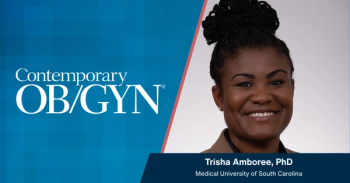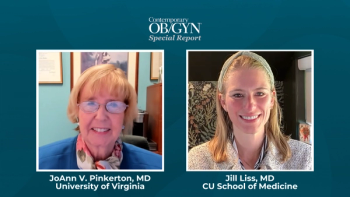
Sarah M. Crafton, MD, discusses how a new investigational robotic platform is expanding minimally invasive options and improving outcomes for patients.

Sarah M. Crafton, MD, discusses how a new investigational robotic platform is expanding minimally invasive options and improving outcomes for patients.

Research found only modest neonatal outcome differences between general and neuraxial anesthesia during cesarean delivery.

Michael Warren, MD, MPH, FAAP, explains the nation’s stagnant preterm birth rate and widening disparities highlighted in the 2025 report.

Deborah Anderson, PhD, highlights the need for improved contraception access, education, and research support worldwide.

Discussion highlights fezolinetant’s rapid-onset efficacy, favorable tolerability, and safety findings as the first NK3 antagonist approved for VMS.

The panel reviews the role of NK1 and NK3 receptors in thermoregulation and symptom genesis, setting the stage for targeted therapy.

Jessica Golbus, MD, discusses the benefits of cardiac rehabilitation and innovative solutions to improve access and engagement.

Jun Wang, PhD, and Rajesh Miranda, PhD, outline why prevention alone is insufficient and emphasize the need for early diagnosis for children affected by prenatal alcohol exposure.

Drawing on work by Rajesh Miranda, PhD, and Jun Wang, PhD, new evidence shows that prenatal alcohol exposure alters cognitive flexibility.

A phenotype linking hypertensive disorders of pregnancy with preterm birth and large-for-gestational-age infants may reshape understanding of maternal cardiovascular risk.

Experts contrast traditional hormone therapy with newer nonhormonal agents, outlining patient suitability and limitations.

Discussion centers on the daily and long-term consequences of untreated VMS, including sleep disruption, fatigue, and cognitive decline.

Panelists describe how hypothalamic KNDy neuron dysregulation drives hot flashes and night sweats following estrogen decline.

Pauline Maki, MD, welcomes the expert panel and introduces the focus on novel mechanisms and emerging therapies for vasomotor symptoms in menopause.

Declining national screening rates highlight the need for increased investment, education, and innovative approaches to expand access.

Study finds women on hormone therapy lost more weight with tirzepatide, though researchers stress association—not causation—needs confirmation.

Fertility expert Lucky Sekhon, MD, and Olympic gold medalist Tara Lipinski discuss the psychological challenges of infertility.

New data suggest hormone therapy may increase autoimmune disease risk in postmenopausal women, highlighting the need for clinical vigilance.

Experts highlight future research in personalized menopause care, exploring hormone safety, the microbiome, cognition, and metabolic health.

Experts compare hormone and nonhormonal options for menopause, emphasizing tailored care, persistent symptom relief, and safe use of local estrogen.

Experts discuss how neurokinin receptor antagonists offer rapid, durable, and nonhormonal relief for vasomotor symptoms, reshaping menopause care.

Experts discuss neurokinin receptor drugs, CBT, and lifestyle tools for managing vasomotor symptoms, emphasizing innovation and evidence-based care.

Experts discuss contraindications to hormone therapy and evolving care for women with early or surgical menopause, emphasizing individualized treatment.

Experts review updated VMS treatment guidelines and stress shared decision-making to personalize hormone and nonhormone therapy options.

Experts emphasize normalizing menopause discussions early to reduce stigma and improve communication in both clinical and workplace settings.

Experts discuss how culture, stigma, and inequities shape menopause care and leave many women without adequate symptom management.

Experts highlight education, equity, and access gaps in vasomotor symptom care, calling for stronger clinician training and awareness.

Experts discuss updates in the management of vasomotor symtpoms in menopause, including unmet needs, quality of life impacts, and new therapies.

Nearly 30% of long COVID patients show signs of postural orthostatic tachycardia syndrome, a condition tied to worsened fatigue and recovery.

Estrogen decline during menopause alters fat, muscle, and lipid metabolism; multimodal lifestyle strategies help reduce cardiovascular risk.